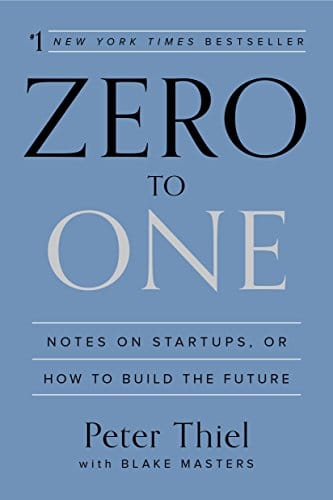The author, Peter Theil, is a renowned investor, entrepreneur, and funder of companies such as SpaceX & Airbnb. In his book Zero To One, he talks about building a startup from scratch, the challenges one may face, and what all one should do to make it successful.
He shares his thoughts on taking a new idea of a product or service that people haven’t seen or heard of before and scaling that as a company, that is, in other words, taking something from ‘Zero to One’.
It’s easy to copy something & increase the competition but if we look back in history, it is the unique ideas that sell, be it the first-ever computer programs by Microsoft or selling a wide variety of goods online such as Amazon. One main idea of the book is that competition is bad for business and employees. A monopoly is good for them as competition squeezes out all the profits and monopoly generally have large profit margins. Examples are Google, Facebook, and Apple.
Here are 5 key lessons from Zero To One by Peter Theil that can help you to build an innovative & successful startup:
1. One Niche At A Time

When you think of your idea for a startup, think of something in a less explored field, which could have a selected group of loyal customers and would make your company different and would attract people who were alien to that field earlier.
The author, Peter Thiel, was one of the core members of the founding team of Paypal. He spoke about how Paypal came up with a unique system that gave people all over the world control over their currencies digitally like never before.
2. Work Towards Building A Monopoly
Peter Theil wrote this in an article on Wall Street Journal:
“The opposite of perfect competition is a monopoly. Whereas a competitive firm must sell at the market price, a monopoly owns its market, so it can set its own prices.”
If the quality of your products & services is great and has proprietary technology and network effects, it would lead to building a brand monopoly for you in the market and you would higher margins and other benefits of monopolies. He also adds in the book that the higher the price of your product, the more you can (and you should) spend on sales.
3. Innovate Around The Market
The book states that it’s important to learn from asking the right questions to potential customers and researching about the scope of your offerings.
Research on the companies that offer products in the same category – be it mobile apps, food trucks, etc. Compare the prices and study their USP’s and then come up with the best possible products and offers that don’t exist in the market.
4. Improve Existing Business or Products
A lot of times, we are not exactly building from scratch, we already have a few products selling. It’s possible that they might not be doing so well so you think of coming up with a new line completely. To save your cost of introducing more products, you can look if any innovation can be made to the existing products.
“Grand visions inflated the bubble, so they should not be indulged. Anyone who claims to be able to do something great is suspect, and anyone who wants to change the world should be more humble. Small, incremental steps are the only safe path forward.” – Peter Theil
5. The Last Mover Advantage
The first-mover advantage has its perks but nothing can be better than having the benefits of remaining the last significant player. It’s all about a startup surviving and outlasting the competition.
He also adds that good teamwork has a big hand in the success of a startup. The founders and their beliefs should be on the same page and know each other before starting the company.
Conclusion
The author says that people believe there are no mountains left to climb as there is nothing that hasn’t been discovered. But the reality is that there is always something that we miss, something new to bring to the table. In the book Zero to One, Peter Theil shares the below Seven Questions that Every Business Must Answer.
- The Engineering Question – Can you create breakthrough technology instead of incremental improvements?
- The Timing Question – Is now the right time to start your particular business?
- The Monopoly Question – Are you starting with a big share of a small market?
- The People Question – Do you have the right team?
- The Distribution Question – Do you have a way to not just create but distribute your product?
- The Durability Question – Will your market position be defensible 10 or 20 years into the future?
- The Secret Question – Have you identified a unique opportunity that others don’t see?
